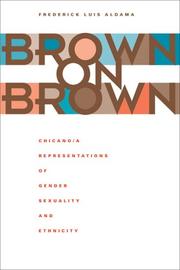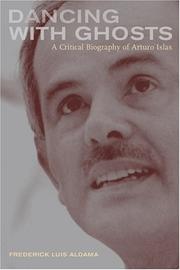| Listing 1 - 5 of 5 |
Sort by
|

ISBN: 0292796781 0292706960 Year: 2005 Publisher: Austin : University of Texas Press,
Abstract | Keywords | Export | Availability | Bookmark
 Loading...
Loading...Choose an application
- Reference Manager
- EndNote
- RefWorks (Direct export to RefWorks)
Popular fiction, with its capacity for diversion, can mask important cultural observations within a framework that is often overlooked in the academic world. Works thought to be merely "escapist" can often be more seriously mined for revelations regarding the worlds they portray, especially those of the disenfranchised. As detective fiction has slowly earned critical respect, more authors from minority groups have chosen it as their medium. Chicana/o authors, previously reluctant to write in an underestimated genre that might further marginalize them, have only entered the world of detective fiction in the past two decades. In this book, the first comprehensive study of Chicano/a detective fiction, Ralph E. Rodriguez examines the recent contributions to the genre by writers such as Rudolfo Anaya, Lucha Corpi, Rolando Hinojosa, Michael Nava, and Manuel Ramos. Their works reveal the struggles of Chicanas/os with feminism, homosexuality, familia, masculinity, mysticism, the nationalist subject, and U.S.-Mexico border relations. He maintains that their novels register crucial new discourses of identity, politics, and cultural citizenship that cannot be understood apart from the historical instability following the demise of the nationalist politics of the Chicana/o movement of the 1960s and 1970s. In contrast to that time, when Chicanas/os sought a unified Chicano identity in order to effect social change, the 1980s, 1990s, and 2000s have seen a disengagement from these nationalist politics and a new trend toward a heterogeneous sense of self. The detective novel and its traditional focus on questions of knowledge and identity turned out to be the perfect medium in which to examine this new self.

ISBN: 0786421851 9780786421855 Year: 2005 Publisher: Jefferson, N.C. McFarland & Co.
Abstract | Keywords | Export | Availability | Bookmark
 Loading...
Loading...Choose an application
- Reference Manager
- EndNote
- RefWorks (Direct export to RefWorks)
"The models of this relatively new Chicano genre are first discussed. Next come analysis and reviews rendering a particular regional or cultural variation of what it means to be Chicano. It is this departure from the norm that defines their writings and distinguishes them from the Anglo-American and British whodunit"--Provided by publisher.

ISBN: 0292796587 0292706898 Year: 2005 Publisher: Austin : University of Texas Press,
Abstract | Keywords | Export | Availability | Bookmark
 Loading...
Loading...Choose an application
- Reference Manager
- EndNote
- RefWorks (Direct export to RefWorks)
Common conceptions permeating U.S. ethnic queer theory tend to confuse aesthetics with real-world acts and politics. Often Chicano/a representations of gay and lesbian experiences in literature and film are analyzed simply as propaganda. The cognitive, emotional, and narrational ingredients (that is, the subject matter and the formal traits) of those representations are frequently reduced to a priori agendas that emphasize a politics of difference. In this book, Frederick Luis Aldama follows an entirely different approach. He investigates the ways in which race and gay/lesbian sexuality intersect and operate in Chicano/a literature and film while taking into full account their imaginative nature and therefore the specific kind of work invested in them. Also, Aldama frames his analyses within today's larger (globalized) context of postcolonial literary and filmic canons that seek to normalize heterosexual identity and experience. Throughout the book, Aldama applies his innovative approach to throw new light on the work of authors Arturo Islas, Richard Rodriguez, John Rechy, Ana Castillo, and Sheila Ortiz Taylor, as well as that of film director Edward James Olmos. In doing so, Aldama aims to integrate and deepen Chicano literary and filmic studies within a comparative perspective. Aldama's unusual juxtapositions of narrative materials and cultural personae, and his premise that literature and film produce fictional examples of a social and historical reality concerned with ethnic and sexual issues largely unresolved, make this book relevant to a wide range of readers.
American literature --- Gays' writings, American --- Homosexuality and literature --- Mexican American gays --- Mexican Americans --- Mexican Americans in literature. --- Gender identity in literature. --- Ethnicity in literature. --- Sex role in literature. --- Gays in literature. --- Mexican American authors --- History and criticism. --- Intellectual life. --- Gays, Mexican American --- Gays --- Gay people's writings, American --- Mexican American gay people --- Gay people in literature.

ISBN: 0292796803 0292706936 029270965X Year: 2005 Publisher: Austin : University of Texas Press,
Abstract | Keywords | Export | Availability | Bookmark
 Loading...
Loading...Choose an application
- Reference Manager
- EndNote
- RefWorks (Direct export to RefWorks)
The second phase of the civil rights movement (1965-1973) was a pivotal period in the development of ethnic groups in the United States. In the years since then, new generations have asked new questions to cast light on this watershed era. No longer is it productive to consider only the differences between ethnic groups; we must also study them in relation to one another and to U.S. mainstream society. In "Shakin' Up" Race and Gender, Marta E. Sánchez creates an intercultural frame to study the historical and cultural connections among Puerto Ricans, African Americans, and Chicanos/as since the 1960s. Her frame opens up the black/white binary that dominated the 1960s and 1970s. It reveals the hidden yet real ties that connected ethnics of color and "white" ethnics in a shared intercultural history. By using key literary works published during this time, Sánchez reassesses and refutes the unflattering portrayals of ethnics by three leading intellectuals (Octavio Paz, Daniel Patrick Moynihan, and Oscar Lewis) who wrote about Chicanos, African Americans, and Puerto Ricans. She links their implicit misogyny to the trope of La Malinche from Chicano culture and shows how specific characteristics of this trope—enslavement, alleged betrayal, and cultural negotiation—are also present in African American and Puerto Rican cultures. Sánchez employs the trope to restore the agency denied to these groups. Intercultural contact—encounters between peoples of distinct ethnic groups—is the theme of this book.
American literature --- Puerto Ricans --- Narration (Rhetoric) --- African Americans --- Mexican Americans --- African Americans in literature. --- Mexican Americans in literature. --- Puerto Ricans in literature. --- Ethnic groups in literature. --- Minorities in literature. --- Sex role in literature. --- Race in literature. --- Minority authors --- History and criticism. --- Intellectual life. --- History --- Minorities as a theme in literature --- Afro-Americans in literature --- Negroes in literature --- African American intellectuals --- Ethnology --- Boricuas --- Rhetoric --- Discourse analysis, Narrative --- Narratees (Rhetoric)

ISBN: 9786612358050 1282358057 1597345695 0520938542 9780520938540 9781597345699 9780520231887 0520231880 9780520243927 0520243927 9781282358058 1417562676 9781417562671 661235805X Year: 2005 Publisher: Berkeley : University of California Press,
Abstract | Keywords | Export | Availability | Bookmark
 Loading...
Loading...Choose an application
- Reference Manager
- EndNote
- RefWorks (Direct export to RefWorks)
This first critical biography of Arturo Islas (19381991) brings to life the complex and overlapping worlds inhabited by the gay Chicano poet, novelist, scholar, and professor. Gracefully written and deeply researched, Dancing with Ghosts considers both the larger questions of Islas's life-his sexuality, racial identification, and political personality-and the events of his everyday existence, from his childhood in the borderlands of El Paso to his adulthood in San Francisco and at Stanford University. Frederick Aldama portrays the many facets of Islas's engaging and often contradictory personality. He also explores Islas's coming into the craft of poetry and fiction-his extraordinary struggle to publish his novels, The Rain God, La Mollie and the King of Tears, and Migrant Souls-as well as his pivotal role in paving the way for a new generation of Chicano/a scholars and writers. Through a skillful interweaving of life history, criticism, and literary theory, Aldama paints an unusually rich and wide-ranging portrait of both the man and the eventful times in which he lived. He describes Islas's struggle with polio as a child, his near-death experience and ileostomy as a thirty-year-old beginning to explore his queer sexuality in San Francisco in the 1970's, and his fatal struggle with AIDS in the late 1980's. Drawing from hundreds of unpublished letters, lecture notes, drafts of essays, novels, and poetry archived at Stanford University, Aldama also deals frankly with the controversies that swirled around Islas's impassioned love life, his drug addictions, and his scholarly and professional career as one of the first Chicano/a professors in the United States. He discusses the importance of Islas's pioneering role in bridging Anglo, Latin American, Chicano/a, and European storytelling styles and voices. Dancing with Ghosts succeeds brilliantly both as an account of a fascinating life that embraced many different worlds and as a chronicle of the grand historical shifts that transformed the late-twentieth-century American cultural landscape.
Mexican Americans in literature. --- Mexican American authors --- Mexican Americans --- English teachers --- Authors, American --- Intellectual life. --- Islas, Arturo, --- Stanford University --- Leland Stanford Junior University --- Leland Stanford Jr. University --- Universidad de Stanford --- Stėnfordskiĭ universitet --- Dānishgāh-i Istānfūrd-i Kālīfurniyā --- Faculty --- 1970s. --- 1980s. --- 20th century. --- aids. --- american borders. --- american figures. --- arturo islas. --- chicano scholars. --- chicanos. --- critical biography. --- cultural landscape. --- drug addiction. --- el paso. --- famous authors. --- fiction writers. --- gay figures. --- lgbtq. --- literary critics. --- literary figures. --- literary theory. --- nonfiction survey. --- nonfiction. --- poetry. --- polio. --- political figures. --- queer sexuality. --- racial identification. --- san francisco. --- sexuality. --- social history. --- stanford university. --- united states.
| Listing 1 - 5 of 5 |
Sort by
|

 Search
Search Feedback
Feedback About
About Help
Help News
News